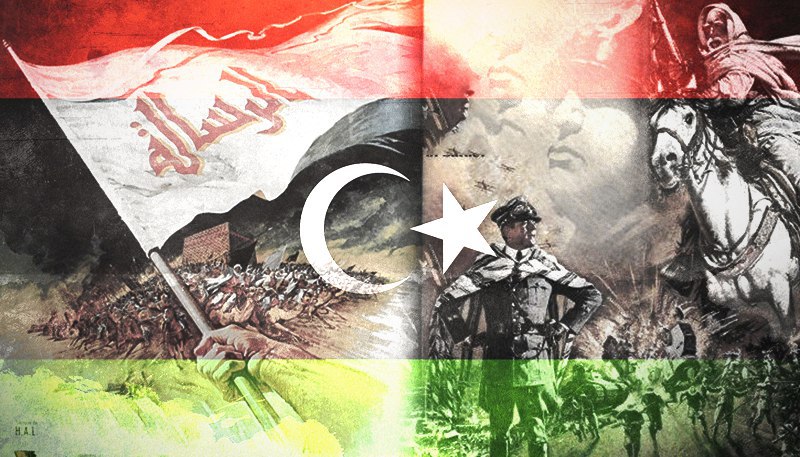Today, Libya is one of the few states that is beyond comparison in its apparent relationship with the art of cinema, its distinctive history in the medium, famous directors and national cinema. Although it has attracted many moviemakers in the West due to its deserts and mysterious cities and has been used as an open stage for many films being both a North African and a Mediterranean country, due to the deep turmoil and a civil war since 2011, we are left with a nation that has had to almost completely reset its ties to the seventh art of cinema, both in terms of production and the consumption.
Libya, has a population of about 7 million, and a surface area of roughly 1,760,000 square kilometers; that’s two and a half times that of Turkey. In a country, which has no significant industrial capacity other than its oil and gas resources, it would seem that the film industry cannot even be mentioned. We should note that only one movie theater in Libya is active today, and that it is forbidden for the women, and only serves for the militia forces in Tripoli, or, better put, Libyan cinema is behind even Burkina-Faso, one of the poorest countries of Africa and the world.
THE COUNTRY OF HOPE FOR THE WRESTLER
Other than the exclusive economic zone agreement between Turkey and Libya, which has changed all the balances of power in the Eastern Mediterranean,the Turkish public first noticed the country when the Ottoman Army officer Mustafa Kemal fought against the Italian occupation in 1911. The actions of Libya, such as standing by Turkey during the Cyprus Peace Operation in 1974 and helping by not complying on the international embargo on Turkey, still holds an important place in historical relations. After some time, “Libya” emerged as an opportunity for our immigrant workers, contractors and businessmen. In the 1985 film “The Wrestler”, directed by Zeki Okten, an unemployed young man trying to make money in oil wrestling tournaments, while looking for a way to go to Libya to work. The film stars Tarik Akan, and Libya had replaced Germany in terms of our immigrant workers for some time.
THE CINEMA THAT CAME WITH THE OCCUPATION
If we must find a historical beginning, the film “Les habitants du desert de Lybie”, a 1910 French documentary, is likely the first movie filmed in Libya. This country, which the Italian occupation forces had also prepared some short documentaries and short reports regarding, also opened up several movie theaters for its own citizens, going through such efforts during World War II. British, Italian and German cameras have filmed there excessively ever since. Documentary images and records from the international agencies have gathered a rich accumulation, from the independence of Libya after the war, which also brought a dynamic film industry and dramatically increased visual-artistic efforts, especially in order to support the tourism sector. With the cinema center for 16-millimeter documentaries and reports opening in 1959 and the acceleration of its development with mobile teams traveling all over the country, cinema became one of the most popular forms of entertainment for the Libyan people, largely thanks to imported films. The increase in the numbers of examples from Hollywood and the European cinema came to an end when Colonel Muammar Gaddafi took power in 1967, replacing the kingdom with the Arab Republic of Libya, which was the first independent republic established on the African continent. Gaddafi, who had seen foreign films as an important tool of cultural imperialism, ended the importation of the movies and took charge of the film production himself. While Abdellah Rezzoug’s 1972 “When Fate Hardens” became the first film in independent Libya, the General Directorate of Cinema was created in 1973, and until 2010, it has advocated the shooting of the films in accordance with the Libyan government’s domestic and foreign policy and cultural, religious and legal orientations as well acting as a regulatory department.
https://twitter.com/uwidata/status/1285597421821726720
MUAMMAR GADDAFI’S SUPPORT
The modernizing steps and actions, taken in both political and economic terms, after the proclamation of the Socialist People’s Libyan Arab Jamahiriya in 1977, were interestingly not reflected in the cinema efforts. Producing a very large number of films during the 1970s and 1980s and closing most of its movie theaters due to the ban on the foreign movies, Libya began experiencing a period of decline in cinema, despite Muammar Gaddafi personally paying attention to it.
The interesting thing is that, despite these realities, Muammar Gaddafi contributed two great movies to both the Islamic world and to the cinema history: “The Message: The Story of Islam” (1976) and “Lion of the Desert: Omar Mukhtar” (1980). Both films were made by Syrian-born producer-director Moustapha Akkad, who died with his daughter in a bombing by al-Qaeda in the Jordanian capital Amman, on November 11th 2005.
“The Message”, which starred celebrities such as Anthony Quinn, Irene Papas and Michael Ansara, could have never been made without Muammar Gaddafi’s heavy financial support, as there was a strong reaction to it from some parts of the Islamic world. As a result, the film was completed by a Libyan-Lebanese-Kuwaiti-Moroccan-British co-production, and is considered to be one of the masterpieces of the movies in historical-religious category up to this day; Gaddafi plays a large role in this. Let us also mention that the movie caused some reaction from Egypt and Saudi Arabia, and it was only finally allowed to be shown in Egypt in 2007 (still without the Islamic clerics’ approval) and in Saudi Arabia only in 2018.
Starring Anthony Quinn and Irene Papas, “Lion of the Desert: Omar Mukhtar”, was a Libyan-American co-production film because of Moustapha Akkad being a well-known Hollywood producer, who Muammar Gaddafi personally requested. “We also have our hero, make a movie of him”, Gaddafi told the director, offering his unlimited support. This movie, which depicts the life and death of Omar Mukhtar, a Libyan national hero who fought against Italian colonialism in 1929, has become Libya’s second major contribution to the history of cinema.
Moustapha Akkad went to Amman in order to seek support funds for the film “Salah Ad-Din Ayyub ”, and there he was killed in an al-Qaeda bombing. It is likely that he would have worked with Gaddafi again on another film, and that the cinema world would have another story about an Islamic hero who repelled the Crusades, took Jerusalem from the Crusaders and ended the Christian reign over the city. Sadly, this never happened, as both Akkad and Gaddafi were killed. Nonetheless, their collaboration marks one of the high points of Libyan cinema, and is undoubtedly a gift to the world of film.
https://twitter.com/uwidata/status/1288553227684806665

















Leave a Reply